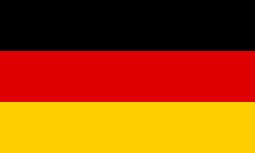|
|
| |
|
|
| |
|
|
|
|
| |
 |
| The flag of Germany. |
German
The German language (German: Deutsch or (die) deutsche
Sprache) is a West Germanic language in the
Indo-European language family.
It is spoken in Germany, Austria, Switzerland,
Liechtenstein and Luxembourg; natively by around 100
million people. It is the most widely spoken mother
tongue in the European Union. There are some people who
speak German in Belgium and in the Netherlands, as well
as in France and Northern Italy. There are people who
speak German in many countries, including the United
States and Canada, where many people emigrated from
Germany. In Eastern Europe, too, in Bulgaria, Romania,
Russia, etc. |
|
German is a part of the West Germanic language family (a
group of languages that are similar) and is much like
English and Dutch. A lot of the vocabulary in German is
related to English, but the grammar is more complicated.
German has a system of cases, and when helping verbs are
used, the main part of the verb must be moved to the end
of the sentence. For example, "Someone has stolen my
car" is Jemand hat mein Auto gestohlen (Someone has my
car stolen) or, "Someone called me last night" is Jemand
hat mich letzte Nacht angerufen (Someone has me last
night called).
In German writing, every noun must start with a capital
letter. English and Danish also did this long ago, but
not now. Today, German is the only language that has
this rule. |
|
|
While German is an official language in Switzerland, the
Swiss dialect of German is difficult for native speakers
from Germany, and even for Swiss who are not native to
speaking German, to understand. One reason why the
dialects are still so different today is that even
though Switzerland adopted Standard German, mostly as a
written standard, German Swiss in WWII wanted to
separate themselves from the Nazis by choosing to speak
the Swiss dialect over the standard dialect. Swiss
German also has some differences in writing, for
example, the letter ß, which is only seen in German, is
always replaced by ss. |
|
|
English has taken many loanwords from German, often
without any change of spelling (aside from, often, the
elimination of umlauts and not capitalizing nouns). |
|
|
 Kiddle: German Kiddle: German
Wikipedia: German |
|
|
|
|
|
|
|
|
|
|
|
|
|
|
|
|
Search Fun Easy English |
|
|
|
|
|
|
|
|
|
|
|
|
|
|
|
About
Contact
Copyright
Resources
Site Map |